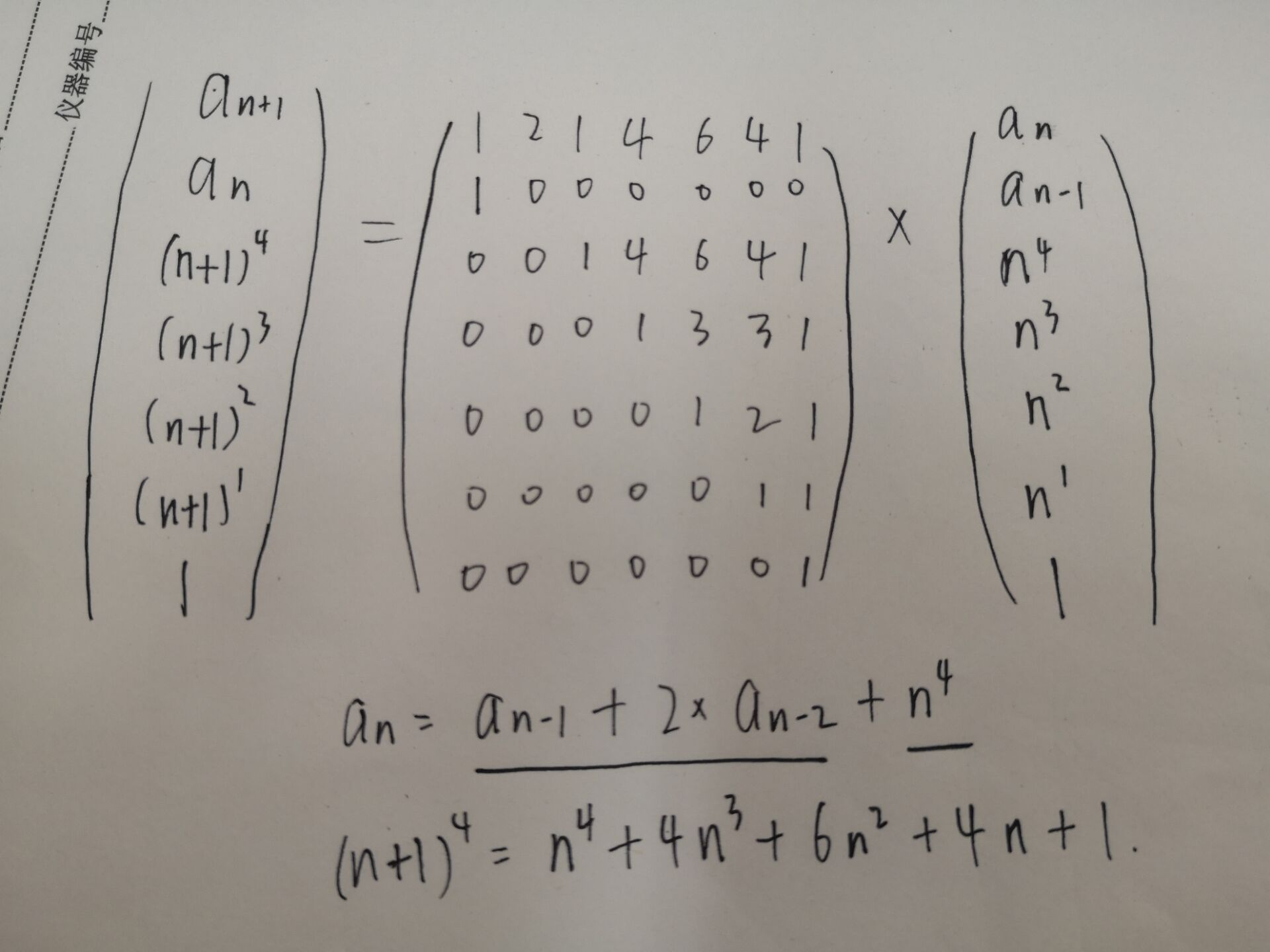Recursive sequence
Farmer John likes to play mathematics games with his N cows. Recently, they are attracted by recursive sequences. In each turn, the cows would stand in a line, while John writes two positive numbers a and b on a blackboard. And then, the cows would say their identity number one by one. The first cow says the first number a and the second says the second number b. After that, the i-th cow says the sum of twice the (i-2)-th number, the (i-1)-th number, and i4i4. Now, you need to write a program to calculate the number of the N-th cow in order to check if John’s cows can make it right.
InputThe first line of input contains an integer t, the number of test cases. t test cases follow.
Each case contains only one line with three numbers N, a and b where N,a,b < 231231 as described above.
OutputFor each test case, output the number of the N-th cow. This number might be very large, so you need to output it modulo 2147493647.Sample Input
2 3 1 2 4 1 10
Sample Output
85
369
Hint
In the first case, the third number is 85 = 2*1十2十3^4. In the second case, the third number is 93 = 2*1十1*10十3^4 and the fourth number is 369 = 2 * 10 十 93 十 4^4.
矩阵快速幂。利用了矩阵合并将两个递推关系合并到一个矩阵中。
之前做过了不少含有变量项的题,这道题是底数为变量,指数为常数的一种。
其中变量项的递推利用了二项式定理,系数满足杨辉三角规律。
#include <bits/stdc++.h> #define MAX 10 #define MOD 2147493647 using namespace std; typedef long long ll; struct mat{ ll a[MAX][MAX]; }; mat operator *(mat x,mat y) { mat ans; memset(ans.a,0,sizeof(ans.a)); for(int i=1;i<=7;i++){ for(int j=1;j<=7;j++){ for(int k=1;k<=7;k++){ ans.a[i][j]+=(x.a[i][k]*y.a[k][j]+MOD)%MOD; ans.a[i][j]%=MOD; } } } return ans; } mat qMod(mat a,ll n) { ll tt[][8]={0,0,0,0,0,0,0,0, 0,1,2,1,4,6,4,1, 0,1,0,0,0,0,0,0, 0,0,0,1,4,6,4,1, 0,0,0,0,1,3,3,1, 0,0,0,0,0,1,2,1, 0,0,0,0,0,0,1,1, 0,0,0,0,0,0,0,1}; mat t; for(int i=1;i<=7;i++){ for(int j=1;j<=7;j++){ t.a[i][j]=tt[i][j]; } } while(n){ if(n&1) a=t*a; n>>=1; t=t*t; } return a; } int main() { int t,i,j; ll n,a,b; scanf("%d",&t); while(t--){ scanf("%I64d%I64d%I64d",&n,&a,&b); if(n<3){ if(n==1) printf("%I64d ",a); if(n==2) printf("%I64d ",b); continue; } mat x; memset(x.a,0,sizeof(x.a)); x.a[1][1]=b; x.a[2][1]=a; x.a[3][1]=2*2*2*2; x.a[4][1]=2*2*2; x.a[5][1]=2*2; x.a[6][1]=2; x.a[7][1]=1; x=qMod(x,n-2); printf("%I64d ",x.a[1][1]); } return 0; }
